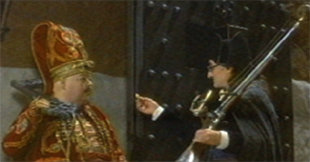THE TERRY GILLIAM FILES // "MUNCHAUSEN" (1989) |
MUNCHAUSEN Litigation |  |
|
Perhaps no $47 million enterprise can pass without leaving a trail of lawsuits and injunctions. The high-profile MUNCHAUSEN was no exception. In December 1986, as Gilliam and Arnon Milchan were shopping the project around, Gilliam's lawyer received a telex from Allan Buckhantz, a producer who claimed to own all sequel, remake and ancillary rights to the 1943 UFA film of MUNCHHAUSEN by Josef von Baky (which Buckhantz had obtained rights to in 1968). The UFA picture already had a troubled past associated with it. When the U.S. Office of Alien Property confiscated prints of German films in July 1945, two Army officers "sold" a 35mm print and "rights" to Edward Finnery, whose later claims of ownership were disputed by the F.W. Murnau Foundation, the owners of the film, when they restored the picture for re-release in the late 1970s. Buckhantz claimed that Gilliam and McKeown's screenplay infringed upon his rights to set up his own "Munchausen" film, which he claimed to have shopped around (complete with 3,000 conceptual drawings) at nearly every studio. "I have been at it for 18 years, I have had 3 actors/stars (Muenchhausens) and 1 director die on me ... sad don't you think?" Buckhantz's letter continued: "The responses thereto, from Studio Management were amazingly unison WONDERFUL SUBJECT, GREAT STORY AND CONCEPT, GOOD SCREENPLAY (which needs some work) ... TOO EXPENSIVE! "I have therefore deemed it appropriate to cause other arrangements, in effect as of or about early 1982. Since we were not seeking arrangements vis-a-vis Hollywood, we deemed it appropriate not to discuss it, not to cause limited press information .. . all in good time." When Buckhantz dropped his suit, Columbia feared he might introduce a suit in Germany, perhaps a more favorable territory for the plaintiff's case. Columbia sought an injunction against Buckhantz, who turned around and filed a cross-complaint, this time naming Gilliam, producer Thomas Schuhly, Charles McKeown, Jake Eberts "and Does 1 through 50." Charging that Columbia and the individuals "acted in a malicious, oppressive, despicable and fraudulent manner in wilful and conscious disregard of cross-complainants' rights and with a wilful intent to vex, annoy, harass, and otherwise injure cross-complaintants," Buckhantz requested punitive and exemplary damages of $300 million from each named defendant. The most Buckhantz got from the California Superior Court was a title card, attached to the film, stating that Gilliam's MUNCHAUSEN is a new film, and not in any way associated with the UFA version – which likewise had been adapted from public domain materials.
Gilliam himself barely recovered from the completion of the film when he was haunted by the specter of his negotiations with Film Finances the previous year. The firm challenged Gilliam to a tug-of-war over his salary, believing it within their rights to garnish it to pay for the film's overages. Gilliam's pay would be parceled out in bite-size chunks, with the bulk to be paid upon delivery of the finished pictured ("in a timely and economic manner") to Columbia. Gilliam was perplexed when, weeks after the picture was safely in Burbank, and even after the German premiere in early December 1988, his final $267,500 payment was not forthcoming. Steve Ransohoff's two-page letter stated in clear terms that they were not only unwilling to pay but also quite willing to haul Gilliam into court — ending, ironically enough, "Best wishes for the holidays and New Year." Gilliam's reply to Richard Soames at Film Finances, dated December 29, 1988:
An arbitration hearing n Los Angeles was deemed too expensive to pursue, as Gilliam's legal fees would have eaten up most of his award if he had won. Finally, the decision by Gilliam not to fight for his salary was driven by his exhaustion from suffering through the "nightmare" of production, and he did not wish to prolong the agony further by reliving the nightmare.
A rather unexpected legal action came via the officious letter sent to Columbia following the release of the film. Representatives from Peacock, Fordney, Cady, Ingleson & Prine, a Saginaw, Michigan law firm, stated that the "use of Baron Munchausen's name" in the film was an invasion of privacy against one of their clients, who happened to be named ... Baron Munchausen. Since the Columbia MUNCHAUSEN was not spelled MUNCHHAUSEN, as in the original Baron's case, the attorneys thought it "interesting" that the filmmakers should incorporate and appropriate their client's name. In addition, Munchausen's young boy, also named Baron, had become the target of ridicule at the schoolyard because of the film. "We are fortunate insomuch as the United States Supreme Court has already decided the issue as to the property right associated with ones good name," the letter stated hopefully.
| |||||||||||||||||||||||||
copyright 1992, 2009 by David Morgan
All rights reserved.








